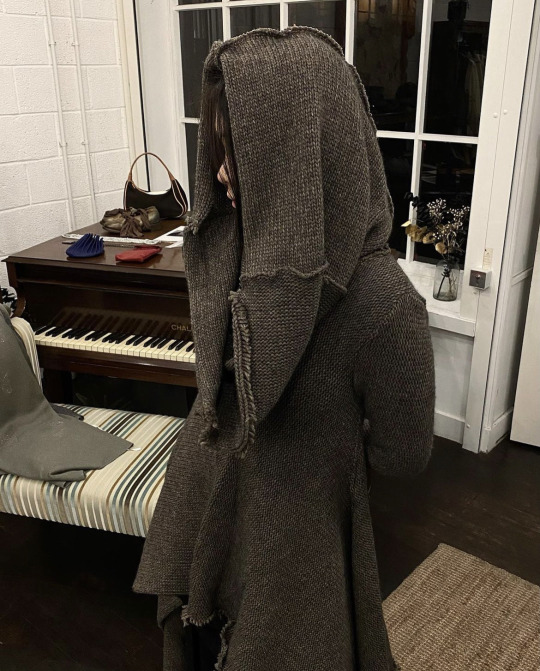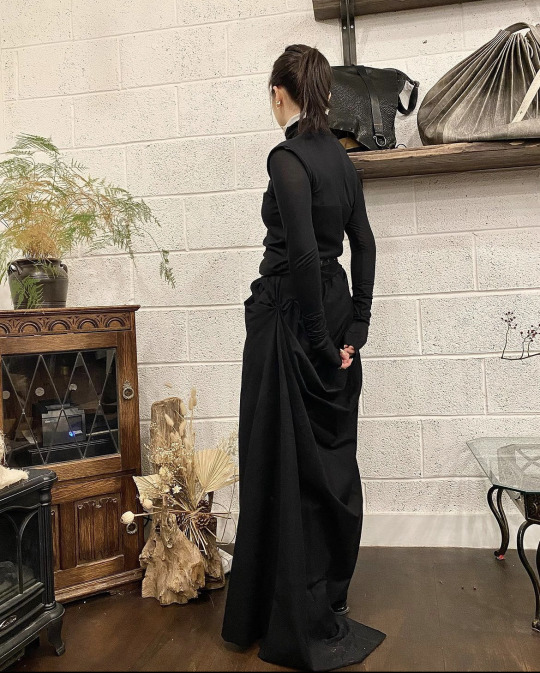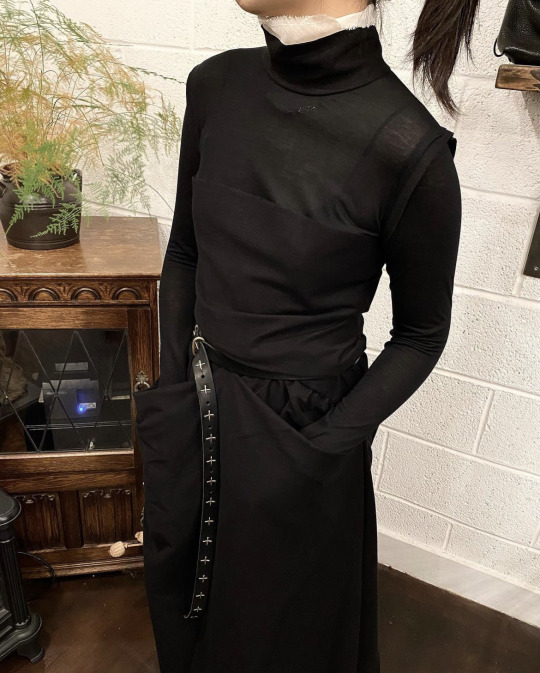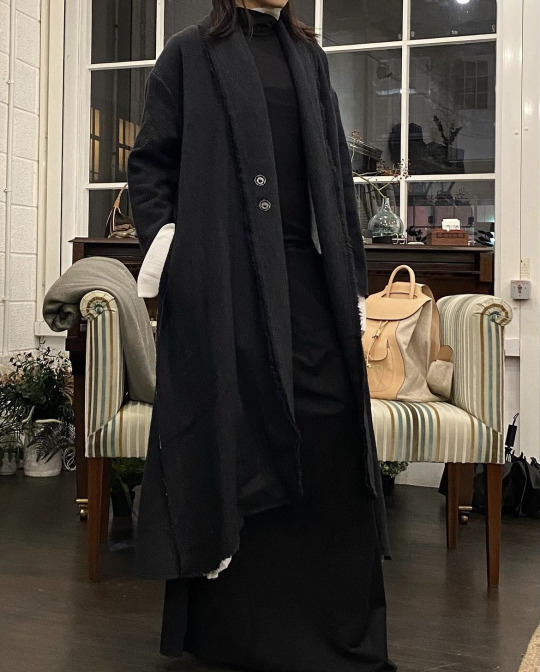#un-namable
Text
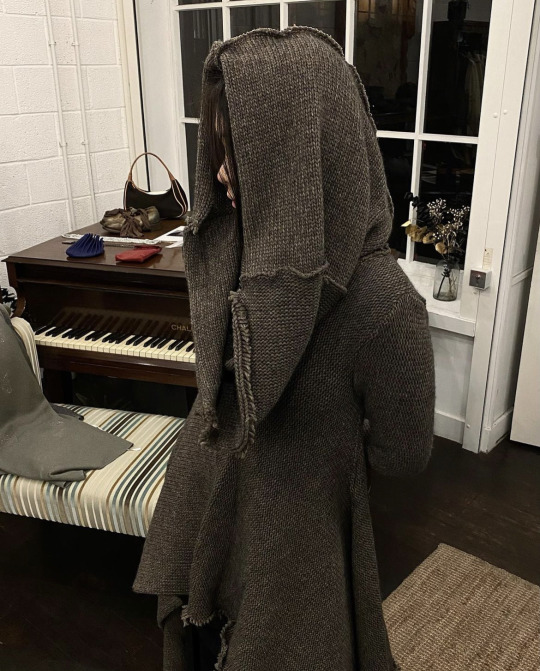

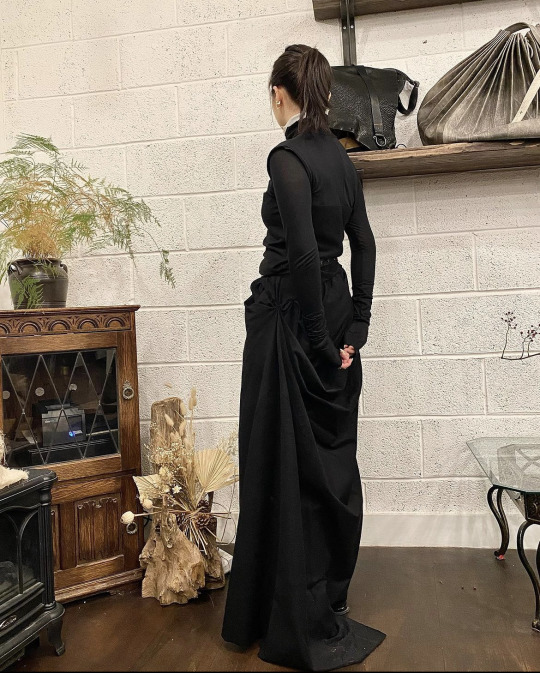
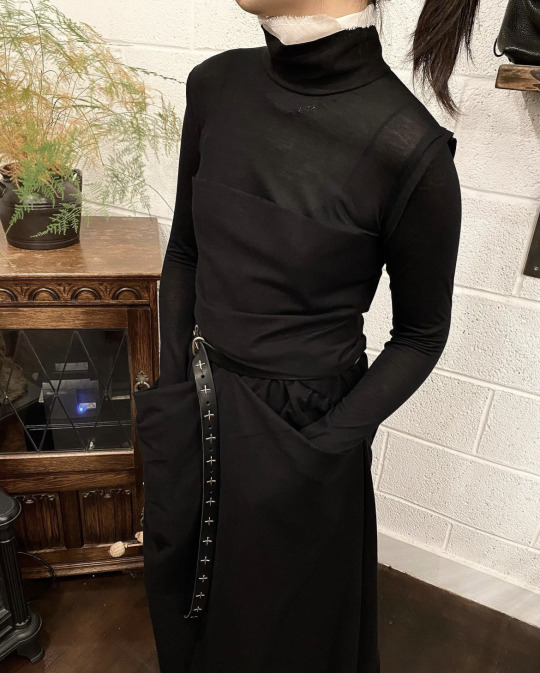
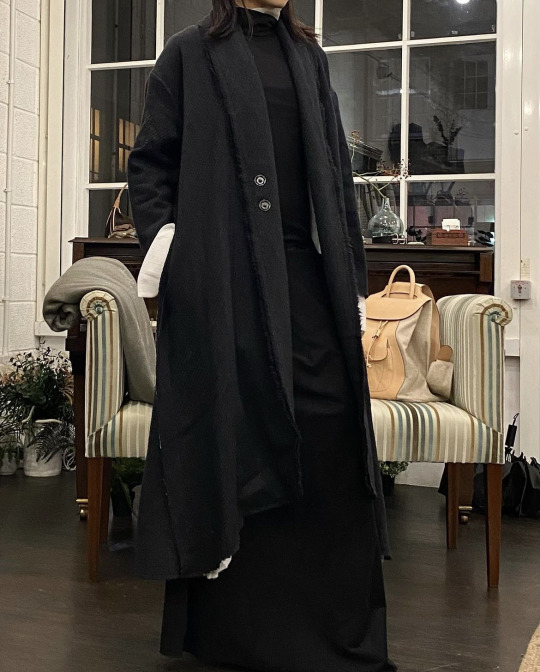
styling at Vertice for the brand Un-Namable
244 notes
·
View notes
Text
'Is it possible to look forward to something that you know is going to emotionally destroy you? That’s the un-namable feeling that was stirred in many upon watching the trailer for Andrew Haigh’s All Of Us Strangers; which features Andrew Scott and Paul Mescal in a haunted love story.
As it turns out, watching the full film is an even more white-knuckle assault on the soul, and long after stepping out from the cinema, All Of Us Strangers will haunt you like the spectres that appear in the story. But once you’ve picked through all the emotional rubble, what happened in the ending, and what does it all mean? Spoilers, obviously, ahead…
Adapted from the 1987 Japanese novel, Strangers, by Taichi Yamada, Scott plays Adam, a gay scriptwriter who lives – almost – alone in a Ballardian high-rise building in London. As he struggles to write a story, based on his family, he revisits his family home in the suburbs near Croydon (actually Haigh’s own childhood home), only to find his deceased parents (played by Jamie Bell and Claire Foy) – who died when he was 12 in a car crash – still living there, stuck in the ‘80s era in which he last saw them. They invite him in to catch up on the years past between them.
Running concurrent to these apparitions, he then meets Harry (Mescal), a man who lives in the same apartment block, and who, once Adam lets in, both literally and emotionally, they go on to have a passionate yet nurturing relationship. Both men address their sexuality: Adam lets his guard down, and Harry appears to be an antidote to his insecurity about his queerness, the loss of his parents and his loneliness.
Ending explained
After the clubbing scene – one of the most realistic on-screen depictions of a hedonistic night out in recent memory – Adam’s reverie in having his parents “back” and being secure in a loving relationship with Harry all starts to unravel.
He’s told by Harry that, while high on ketamine in the club, he had a meltdown, screaming out for his mum and dad, and that Harry had to take him home. Adam then decides to let Harry in on his visits, taking him home to see his parents. Though Harry appears to catch a glimpse of them, he tells Adam that it’s all in his mind.
The crux of the film comes when Adam’s parents tell him that he can no longer visit him, that he has to let go and get on with his own life, stressing in particular that he needs to take care of Harry, who his mum points out, has a sadness in his face.
Adam returns to his flat in London, but for the first time, heads to Harry’s apartment on the sixth floor. When he enters, he’s greeted by a stench, and he goes in to find Harry, dead, in his bedroom, clutching the same bottle of Japanese whiskey that he was drinking the first night he came to Adam’s door, and was rejected by him.
And here’s the plot twist: Harry died that night, and the entire relationship between him and Adam was all a figment of Adam’s imagination. Adam has been Sixth Sensing throughout the whole film, either as a mental breakdown, disassociating, or a coping mechanism for the deep-seated trauma he still feels from the loss of his parents as a child. The almost maternal way Harry cared for Adam when he had a fever, for example, was wish fulfilment on Adam’s part: he wants a partner to care for him how his mother did, and he projected this role onto a fantasy version of Harry.
But it doesn’t end there, as Harry reappears, in the same pink jumper he wore when he first visited Adam, and confirms that he’s dead (“I was so lonely that night”, he explains mournfully). The pair head back to Adam’s apartment. If this is the reality, Adam appears to reason, he wants to continue the delusion and live in his fantasy world. He has had to say goodbye to his parents – again – but he’s not letting go of the ghost of Harry, who never truly existed in the real-world relationship with Adam, and who seems to represent Adam’s inability to move on in life, and let people in.
The past is where Adam wants to stay – or is he stuck in purgatory, as he’s also dead, as perhaps he has been right from the start? – and as he cosies up to Harry on his bed, the ending gets cosmic. As the pair form a heart formation, cuddled up to each other, a light begins to shine between them, which gets brighter as they recede into the blackness, and other stars begin to shine beside them. As Frankie Goes To Hollywood blares out, it’s “The Power Of Love” indeed, a force from above.
What does the director say about it?
Andrew Haigh spoke with the journalist Evan Ross Katz about the ambiguous ending in his newsletter, Shut Up Evan: “I kind of go back and forth with all of that. I certainly knew that I wanted this film to feel like when you wake up from a dream and you think you understood it but you’re not sure if you did, and you find that the more that you pick at the dream, the more it raises new questions.
“And on the logical front, your sense of the film is correct, but everyone has different interpretations. People have come to me and said, ‘Is Adam dead all along?’ and ‘Is this purgatory’ and ‘Is any of it real?’ I mean, it's a film, so none of it's actually real, but it’s all the manifestation of a feeling, so if people see different things in that, they should. And I'm aware that some people will want a much happier ending and I'm aware of the things that people instinctively want — including myself.”'
#All of Us Strangers#Andrew Haigh#Andrew Scott#Paul Mescal#Strangers#Taichi Yamada#Claire Foy#Jamie Bell#The Power of Love#Frankie Goes to Hollywood
9 notes
·
View notes
Text
If Guido is alive but dead it means he exists but is no one, because he is no longer Guido as his soul is fragmented. That means no one can point at him and name him. People can just point and...awkwardly stay like that. What do you call him? Not Guido, not even man, certainly not animal as he's missing exactly the part of the soul which is shared with animals. He becomes unknowable, just like the object of his poetry. His poetry revolves around the un-speakable nature of his sentiments and the description of the impossibility to describe them. This extreme attempt at saying something is then converted in the resignated contemplation of his state but when his state too becomes un-namable, what then? Poetry would come in the form of an eloquent blank page. Perhaps that's why (as is said by critics) his poems cover only the first half of his intellectual carreer? That's why he then turned exclusively to philosophy (with the occasional poem, that is, such as his famous break-up sonnet)? That's why his fame is linked to philosophy and not poetry? hmm having thoughts...
10 notes
·
View notes
Text
“...My life of Crime”
I wrote this story perhaps 20 years ago to perform on my radio program. I don't recall if I ever posted it here. It's a fairly short story. If you like read when you have the time.
I should say that I had forgotten these events for the entirety of my adult life. It's memory as so much else was triggered by a dream.
"Once Upon a Time...I was breaking and entering. Well not ‘breaking’ but most certainly entering. Back in the old days getting into a house was as easy as opening a window...which I did. When I was a little boy I several times entered other people’s homes. As with all crime this was motivated by want. I wanted to know how other people lived. What were their worlds like. I never took anything on these adventures. My search was inspired by more primal needs.
I was an ‘Other’ and I was searching for other Others. Mind you I could never have explained any of this to my folks or the cops. I just knew I had to know.
To the adventure.
I chose my homes almost randomly. Hey, I was a ten year old kid not a for real crook. The treasure I sought was intangible. The only vague precaution was making sure the houses were empty. This was the early 1960's so near everyone in New York had a job. ...imagine. Everybody was at work so the whole neighborhood was fair game. Block after block of doll houses to explore.
I left the homes of friends alone. The houses of strangers were my object. The unfamiliar the mysterious. Places of different light touch, and smells. Every structure a new world discovered. Oh, the moral obliviousness of children.
As J.M. Barrie put it at the end of "Peter Pan".
"...When Margaret grows up, she will have a daughter, who is to be Peter's mother in turn and thus it will go on, so long as children are gay and innocent and heartless."
That was me alright. So cut me some slack.
Oh, dreams dreams and fantasies.
Family albums. My hunts focused on these. The photos told me in quick detail what I needed to know about who lived in whatever house I was ‘visiting’. The who what, but never the why of these lives. They were generally stored in the same place in house after house. The bedroom closet or close by. So there I would sit on a stranger's bed studying their histories looking for my tribe.
I couldn't begin to explain to anyone why I was doing this. It was an instinctual exploration for un-namable things that I needed...was in desperate want of. I was surprised at how similar all the snap-shots were. Grandma auntie babies somebody in the Army, and birthday parties.
These albums were all like mine. However, on occasion there was a surprise. Once I unknowingly entered the house of a nudist family. I started through their album, and ...good bleeping grief!
I literally at that point in my life had never I mean never seen the like! There they was all...auntie mommy dad, and all the kids: Nekkid as hell! These folks were ‘other’ but not the sort I was looking for.
Close calls: One time I'm on my way to peek through a family album when I hear the front door open. I'm fucked! I'm going to Juvie Hall. My lunch was coming up, and I wet myself a little. My heart is pounding through my Mighty Mouse t-shirt. Some lady, and her kid just came home, and was headed for the kitchen with its open window through which I just came.
This was rapidly turning into a nightmare version of "Mayberry RFD". One where Deputy Barney Fife in Klan robes kicks the living crap out of a Negro in the holding cell. I was ten, but I knew the real score. Looking back my only hope was that the lady was a liberal sociology professor who would understand my quest and ask Deputy Fife not to kill me.
More likely she was married to a corrupt Teamster with a drinking, and violence problem. My odds didn't look good. I wanted to barf. ...ex-Pepsi was running down my legs. I quickly hid behind an old 1930's folding room divider. ...they walked right past me. "??!!!"
The perceived safety of home. No one expects danger or ten year old boys hiding behind old furniture. They went to the kitchen, and I went to the front door, and ran for my life. To this day that kid must be telling his grand kids about the time he, and their great grandma surprised a deranged burglar in their house. Of such are family legends born.
After this shattering event I laid low. Tho’ being stupid though full of grace. I went out again. A few times in fact. I visited several more homes during my life of sincere confused explorations. I never found my Others. I didn't really know who or what I was looking for. But would have known them when I found them.
These outings ended on an ethereal note. I had wandered to the far borders of my hood. The unknown regions. A step more I’d be lost. This time a surviving farmhouse. A lot of farms here before the turn of the 20th century. No kitchen window this time. I entered through the back door which was unlocked.
It was like stepping into an old print. The light was amber...dim. Peeling wallpaper. Pictures of folks dressed as they did long ago. Years of dust covering dark furniture. ...no one home. No one had been home since before I was born. Before my ma was born. Place wasn't abandoned not in the 21st century sense. It was owned but not lived in.
Though summer it was cold. Had chilled tingles standing there. Much as I did when I stumbled on an old graveyard. When Fredrick Olmsted planned Prospect Park, he left historic sites intact. A Colonial graveyard being one of them. Which is what I wandered into. That and got the same feeling I had in that old house. "...Leave!". It was pissed off spirits.
I’ve since read that impressions are left on physical objects by the dying. This explains ghosts’ hauntings. Spirits were saying "Don't Disturb!". I didn't. I left.
So ended my life of Crime. Never found my family of pacifist beatniks. Who would adopt me and teach me to compose haikus. However, several years later...but that's another story for another time.
The End ...mostly
1 note
·
View note
Text
The Tao
The Tao is the essence of everything that exists.
Life itself is born out of the Tao;
it was before the beginning of time and space.
Nothing exists without it.
It is the Oneness in all forms of life.
The eternal flow of existence.
All individual lifeforms are notes in the symphony of the Tao.
The Tao is beyond all description. We call it the Tao because the mind needs words to understand and through the mind we are conscious. We also could call it the Un-namable or the Self, but it really doesn’t matter how we name it; what counts is the experience.
Our job is to realise consciously the Tao.
The word Tao means in Chinese the way or the path. Around this path grows the knowledge of the Tao, it helps us to become the experience of our innermost nature in alignment with the essence of everything.
The knowledge of the Tao is not a teaching, philosophy nor a spiritual tradition. It is the map that indicates the way - and that’s it.
0 notes
Text
is it weird that i still consider my self a little trans? like. like i have a perfectly normal and average amount of gender. but its like so average that its un namable, un knowable. Suspiciously average gender. permanent egg. I'm a hot girl, im an average dude. I'm in that perfect sweet spot of butch where fast food workers are really nice to me.
#sorry thinking about gender today.#also truman show has been so up my ass. i was having trouble focusing in class lol. but were chill
1 note
·
View note
Text
bradycardic
before a heart stops
it starts walking
breaking into the world
out of a bed, out of the undergrowth,
out of a house, out of a church.
walking on steps to the sky
to the stars beyond.
Stars
unpolluted by atmosphere,
by errant light, stars in their acnic arrangement,
spots and pinpricks, neutrons and blackholes and
planets, purple planets, red planets,
take a walk in kepler 286f
51 Pegasi b
55 Cancri e
and the other un-named, un-namable,
the inexorable explanse.
Walking rocks,
barren asteroids,
extremophillic colonies. The solid planets,
the living ones, and the dead.
The longer we spend here
the more it slows down,
the less, the more
time we have.
So choke on blueberry flavoured gas
wonder, and find
a decrepit probe containing a gold disc
with beings of alien appendages,
alien reproductive systems.
It will lie here
not for as long as you, but
until the planet breaks apart.
Time slows to an electron tread.
the absolute timelessness
of subatomy
it takes as much as is possible
to hang on, to keep
perception. Ageless, eternal perception.
To not become
a part of the scenery.
But we all do. The top down view
collapses with the bottom up
and then nothing happens.
Nothing ever has happened.
You have reached heartstop,
seen what you could see,
but you are no longer you.
At this moment, the particular
crashes into the universal.
You are no longer a viewpoint,
the world no longer belongs to you;
you belong only in the world of others.
The universe twirls,
and ants tiptoe in the magnanimous mess.
23 notes
·
View notes
Text
I didn’t get to work on (insert un-namable song) today, but!! I cleaned out over a thousand old emails to save some space, and I painted this figure!!!!
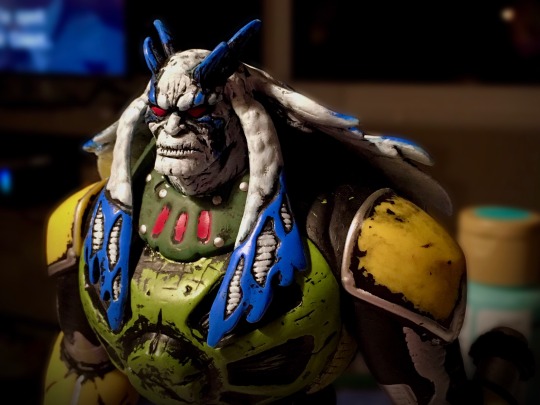
41 notes
·
View notes
Text
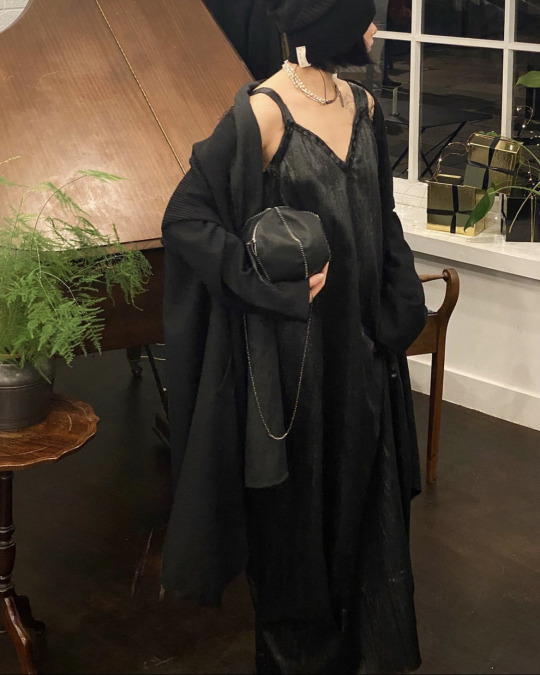
Un-namable Chan dress and Wrinky Kimono, Fintan Mulholland Cylon Hat, RW London triple Pearl choker via vertice london
13 notes
·
View notes
Text
How To Analyze a Character
Have you ever been reading a fic and found the character is not recognizable that causes you to say “I don’t know who that is in that Marinette suit but that’s not Marinette.”
Or when you’re writing there’s that one character you need and you just can’t get inside their head to save your life.
This essay is going to delve into how to analyze characters and how they work in stories. It will help you both articulate why you do or don’t like a particular character or their interpretation, and help you in your own writing of that character.
Characters, as well as other elements of a narrative, can be broken down into collections of recognizable elements often called “tropes.” (For the comprehensive taxonomy see tvtropes.org.) These commonly recurring literary and rhetorical devices, motifs or clichés can be combined in unique ways. They exist as recognizable and namable concepts because the same patterns are used over and over again in the creation of stories. We can use named tropes to describe what we are seeing in one story and relate it to other instances of the same phenomenon.
The advantage of recognizing the tropes that describe a character means that we can import into our understanding of them all of the other instances of that trope we have come across, and then compare and contrast these characters.
For example, both Chloé and Adrien exhibit the “Well Done, Daughter/Son!” Girl/Guy trope, desperately seeking the approval of a distant and withholding parent. (Faramir in the Lord of The Rings and Shinji Ikari in Neon Genesis Evangelion are also prime examples.) Knowing that they are both participants in this kind of relationship we can see how it plays out differently.
Gabriel seems like a deliberate ass, but occasionally manifests approval as when he played the duet with Adrien before sending him off to the Kitty Section concert in Capitan Hardrock. Audrey is entirely un-reflexive in her horribleness, dismissive rather than demanding and only ever recognizes Chloé’s worst feature as admirable. Kagami is also a “well done daughter!” girl and it informs how she relates to Adrein, Chloé, Marinette and Ladybug, providing both for character connection and thematic contrast.
On the production side, tropes can be used deliberately to construct a character to achieve a particular purpose. Adrien was created using the standard tropes of the fairy tale princesses beauty, musical talent, kindness to all creatures (even Chloe), kept looked up by an unloving parental figure. By creating a stereotypical Disney princess but swapping the gender it causes us to think harder about the assumptions we make about Princesses.
Symbols work the same way. We use symbolic images and language in media because it allows us to reference all the other ways and places that symbol is used. It becomes a shorthand for much bigger units of meaning. Pure originality would be completely unintelligible.
For example, Marinette displays two flower motifs on a regular basis. One is the cherry blossom spray across her shirt. Commonly this is associated with both love and passion, as well as purity and transitory beauty. In China, the last three are more closely associated with the Plum blossoms that decorate her purse, chair, and diary. Along with the additional significance of perseverance and hope, we can see that her dreams for the future, however heard she works for them, may not turn out as she plans.
The cherry blossom, in China, is a symbol of passion, strength, and feminine power and sexuality. As Marinette has this symbol peeking out from behind her jaket on the left side of her shirt, it represents how her civilian persona hasn’t fully come into the power she displays as Ladybug. Adrien’s kwami was chosen to be a Black Cat specifically to call up all our associations with them and bad luck as a counterpoint to Ladybug and her Lucky Charm.
Pikachu, I Choose You!: Artistic Decisions
You would think this wouldn’t need to be said but remember, remember, remember: these fictional characters are not real people. Why does that matter? Because everything you see on the screen or on the page is the result of a choice made by the writer or artist.
Images and dialogue may be selected deliberately, thoughtfully, thematically, instinctually, carelessly, haphazardly, or stupidly, but they are there because the authors and illustrators and creators selected them to be there.
Remember that the characters only exist to serve the story and everything about them ideally should serve to move the story toward its conclusion.
This is especially pertinent in an animated–and especially a computer animated–show because everything has to be made specifically for the show and they are expensive to make(MLB costs ~$460,000 an episode). That’s why you get only one outfit for most of the characters, except when absolutely necessary.
Saving their production budget for other things is why Theo Barbot has all of the odd jobs in Paris, there seems to be only one cop, Sabrina’s dad, and Alec and Nadja are the only people on TV. If you take a look in Bubbler, the first episode aired in the US, you can see that the school, the bakery, the hotel, and the Agreste Manor are all within one block of each other.
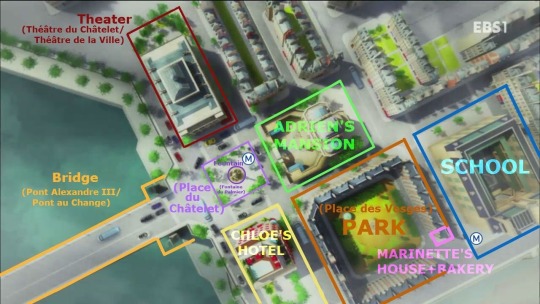
CallMeDale posted this to the Miraculous Fanworks Discord. Source unknown. Image originally from Bubbler.
What this production cost means for analyzing a character (or anything else) is that everything we see in a visual medium is important. Everything about a character has been picked for some reason. How they look, how they move–even how they stand says something about who they are as a person, who they are in their relationships, and who they are as an element of the story.
I did a fairly comprehensive essay on Chloé as a character so I want to walk through some of the things I looked at in order to write it.
Character at First Sight:
First impressions are vital. Because Marinette is picked to be our eyes as the OP starts (“In the daytime I’m Marinette,”) we know she is supposed to be our heroine and point of view. Everything that happens after that is to be judged in relation to her. The first time we see Chloé in the show is a whole 5 seconds into the opening, when she and Sabrina walk past a face-planted Marinette. Immediately afterwards, Chloé runs back in to glomp Adrien and push Marinette out of the way.
From these few brief seconds we know that she is both rich and domineering, Sabrina is walking just behind her with a huge designer purse and bookbag, obviously in a subservient role. Chloé laughs at Marinette, which establishes her as an antagonist to the Heroine. Chloé pushing Marinette out of fram when she comes back shows that she exists in part to block our Heroine from Adrien, our Hero, whose expression shows he really doesn’t appreciate the attention.
Not even three seconds of screen time and we already know who Chloé is in relation to three people: Marinette, Adrien, and Sabrina.
How much time a character gets in the beginning of a story also sets up how much brainspace we allocate them and our expectation of their importance. This is one reason I prefer Bubbler as the “first episode’’ (US viewing order) over Stormy Weather (South Korean/International Viewing order). Stormy Weather spends the first few minutes on Aurore, Mirielle, and Alex before getting to Mari, Tikki, Manon, Alya, and Adrien. Bubbler in the same first minute sets up Marinette, her parents, Adrien, Alya, Chloé, and Nino and all their relationships.
By choosing your descriptions carefully you can get the reader to think of other things without directly mentioning them. Ladybug’s costume, mode of travel and name all callback to Spiderman (she even does the upside down hang in Dark Cupid), and even though the iconic phrase “with great power comes great responsibility,” is never stated its influence is felt in the persistent characterization of Ladybug as ‘all business’ in fic, even though she is more playful in canon. Master Fu is modeled after classic inscrutable mentor Mr. Miyagi from the original Karate Kid movies, it gives him an air of perhaps more wisdom and knowledge than he actually possesses.
Come on Let’s Vogue: How the Look of a Character Informs Us
Now let’s look at what we get from the elements selected for Chloe’s character design. Slender, pale, almost-white blonde hair, sunglasses on the top of her head, lots of blue eyeshadow, yellow jacket over a black and white striped shirt, white capris and black and white flats. All of this says she is the top of the social heap at her school. Combined with her glomping and trying to kiss Adrien and we can guess she is–or at least wants to be seen as–romantically “experienced”. Yellow is a happy color, it’s what makes a printed picture look bright. Often, though not always, it is associated with success and general goodness (i.e. a heart of gold) so she is initially portrayed as a person who doesn’t have any cares. White jeans and shoes point to both her status as someone who doesn’t have to work and a certain level of naivete.
But she also has this very gothy studded belt around her hips. It is very obviously not holding up her pants. This hints at the darker emotions and experiences at her core. The black and white stripes of her undershirt hint at the way she is held prisoner by her past.
Because we have been set up to see Chloé as the spoiled,rich bitch with everything she could want, when the facade cracks and we see just how awful her mother is it hits all the harder for us. Chloé’s invulnerable image is destroyed.
“What’s in a Name?”: Tagging as Character creation
Names are also a good starting place for getting into a character.
Bourgeois comes layered with the connotations of wealth, but not too much, and shallow conformity. Chloé is derived from the Greek Khlóe, or ‘young green shoot’ (of a plant), which can also be interpreted as meaning 'blooming.’ Khlóe is an epithet, or nickname, for Demeter in her aspect of the Lady of Summer. We know the writers know and are thinking of these meanings because of these lines in Sandboy.
Nightmare Adrien: Marinette, for your birthday, I’m going to buy you flowers—
…
Nightmare Adrien: —hortensias, roses and Chloés. (Marinette shrieks)
Not only does her name sound like that of a Homecoming Queen/Cheerleader/trust fund baby, but it also indicates she is immature but with potential to become something more.
Queen Bee is also laden with meaning as it is a term used to describe girls in their teens who are at the top of their social pecking order (see Queen Bees & WannaBes). It perfectly describes bothe how Chloé acts but also how she perceives herself.
The Things You Do to Me: Character Action
Characters in a story are what they do and more importantly why they do what they do. If Marinette becomes Ladybug for the first time because someone needs saving (first Ivan, then Alya), and Adrien becomes Chat Noir in order to escape the gilded cage that is his house, Chloé dons the Bee miraculous in a desperate (and unsuccessful) bid to catch her mother’s attention.
Attention seeking is part of every subsequent time that her hero persona appears in the story. Consider the implications of the fact that the signal on her roof is a Bee signal, not a Ladybug signal. The gestursal tic she has of always examining her nails, often with the other arm folded over her chest, is a visual shorthand for both her self-absorption and that her unpleasant personality is a defence mechanism.
Dialogue clues are also important, especially things that come up more than once. Chloé’s persistent lack of remembrance of the Concierge’s name (Jean-whatever) shows her to be dismissive of the people she believes to be “beneath her” which becomes horribly ironic when we find out her mother doesn’t seem to remember her name. That Marinette is always Dunain-Cheng, emphasizing her parents status as tradesman and that Marinette is not pure French operates as a persistent put down.
Chloé is a Hero with an F in Good, primed by the writers for the Face–Heel Turn which happens in Miracle Queen. They telegraph this event by the choice to echo her “once a monster always a monster,” line from Stoneheart, in the S3 midseason Stormy Weather 2. There she mocks Aurore with “once a villain always a villain.” Highly ironic given the number of times Chloé has been akumatized and prompted it in others. Her bad heroing serves to show that actions and motives are not always aligned and to highlight the selflessness of the other heroes.
A great example of showing character through dialogue is Nino’s conversation with Gabriel in Bubbler. Nino was given a very distinctive, persistent, and casual speech pattern (“dude” in English), It’s so distinctive that Alya immediately recognizes that he is Carapace. The fact that he makes an effort to suppress it when he is trying to persuade Gabriel to let Adrien have a birthday party shows how much he cares about giving Adrien this gift. It’s part of what establishes him in our minds as such a great friend for Adrien (King of Bros!). Giving characters individualized vocabularies and speech patterns is one of the best ways to help distinguish them in both your, and the reader’s mind.
All Together Now!
As you read and experience more stories, you will recognize more and more common elements across the characters, places, events and ideas that make up the stories you read. As you recognize these building blocks, and how they can be combined and manipulated, they will help you understand better why certain characters do what they do in the story. You can then deliberately select them as you create your own stories to highlight desired themes, set up conflicts or call cultural resonances to your readers’ minds. Remember what you write is a conversation between you, your reader, and the world around you. The more of the world you can bring into your writing the deeper it will impact your readers.
22 notes
·
View notes
Quote
You know, its a good thing we're in a hospital. Because they're going to need all the kingdoms doctors and all the kingdoms nurses to put your sorry ass back together again.
Ash, to the “un-namable freakbag” the father of his former (now comatose) teammate Holly attempted to marry said comatose girl off too. Resulting cleanup bills actually outstripped keeping Holly on life support.
1 note
·
View note
Text
Uuuuuugggghhh
Writing man, writing
Sometimes writing isn’t writing, sometimes it’s re-brushing your teeth and drinking a full glass of water.
Sometimes it’s taking a nap in the sun and listening to your favorite songs.
Sometimes it’s mindlessly scrolling online or re-reading a favorite book, without shame.
Sometimes it’s a long hot shower after a long hot jog.
Sometimes it’s showering your stinky pets 💖
Sometimes it’s doing the dishes and cleaning, maybe even doing that thing you’ve been avoiding all week.
Sometimes writing isn’t writing
But yelling at the top of our lungs, and calling old friends and doodling
Or pacing around the kitchen island with a teacup, it’s liquids slowly getting colder, while your heart and mind get warmer-
Reaching and charging closer to that un-namable it
Sometimes writing isn’t writing
But writing a silly poem about it
Idk man, it’s sometimes, a lot of things
That’s pretty cool too
#well /that/ just fell out of brain unexpectedly#Nico Writes#poetry#Maybe it's writers block#maybe it's maybelline#writing struggles#free form#heck#coming to terms with my mushy brain
11 notes
·
View notes
Text
I am very tired of people and having un-namable feelings that are too strongly felt.
1 note
·
View note
Note
Hearts are made to be broken.-your choice
So this just kept going - Also TW for... murder? kidnapping? (none of it happens in the following one shot but it's all implied
Hearts are made to be broken.
Molly could count on her fingers the number of times she’d been to the prison to see her father. At first, it was because she was too young and no one would take her to see him- then when she hit eighteen and could make the choice for herself, he was in a maximum-security prison that didn’t allow for in-person visits.
That had been a major heartbreak.
Now, finally, he had been transferred to a facility that allowed for visits, and she was nervous. She hadn’t seen him in so long- she brushed her hair, pulling it up into a ponytail, then took it out, letting her hair fall around her face- but that still didn’t feel right. Nothing felt right. She needed it to be perfect.
She had put on a little bit of make up- mascara and a bit of gloss- she’d opted for a pair of athletic leggings and her BAU sweatshirt- then realized why that was stupid and switched it out for a sweatshirt that read ‘the fastest way to a man’s heart is between his 4th and 5th rib’ then realized why that was dumb and settled on a plain blue sweatshirt with nothing on it. No jewelry, sneakers on her feet, and then her hair went back up into the ponytail.
“Okay- you can do this.” She whispered.
She double-checked that she had everything she needed, then headed out of her apartment and down to the garage, getting into her white Mazda and driving off.
The high-security prison was still quite a long drive away and she knew that she’d be in a world of trouble if she got a call from work- but that was a risk she was willing to take.
She was halfway into her three-hour journey when she stopped for McDonalds, chicken nuggets, fries, and a Dr. Pepper, of course, she had to get the honey mustard to go with the nuggets- then back on the road.
Her reason for this visit wasn’t entirely innocent. She hadn’t talked to her dad in person since she got out of school- since she became a BAU agent. She wanted to see him- to look into his eyes. She wanted to understand him and his motives so much better. She pulled into the parking lot, leaving behind her drink and taking in just her ID- locking everything else in the car.
She signed in at the front and when she wrote who she was there for, the man let out a whistle.
“You sure, Sweetheart?” He asked.
“I’m sure, Sugar.” Molly replied. He buzzed her in and she headed for the large common area where he was already waiting.
Jason Piper had aged a lot over the last twelve years. His once blonde hair was now grey and cropped close to his head- a look that didn’t suit him but she imagined it was easier to maintain. He had lines around his eyes and his skin wasn’t tanned and smooth like it had been when she was young.
“Molly.” He stood when she came up and went to hug her.
She was surprised to see he didn’t have cuffs on. He wore the typical grey prison uniform. It reminded her of the pajamas he used to wear. The grey cotton t-shirt and pants that he wore just about every night. She was pretty sure he’d had like 8 pairs that looked identical.
Originally she had thought it was the same one over and over but when she went and read over the notes from the case later on she’d realized he’d had- just a lot of the same pieces.
She didn’t even hesitate to go in for the hug. She probably should have-
He smelled different. The man she knew had smelled like Irish Spring soap and cigarettes. This man smelled sweat and a touch of the un-namable clean soap smell. The kind that didn’t have a real scent- just ‘clean’. He was thin, he’d always been tall and thin, apparently, his time in prison hadn't changed that. He did have some muscle in his arms.
In general- if not for the outfit, he could have easily been mistaken for a Social Studies teacher.
“Sit, please.” He nodded at the plastic table next to them as if he’d invited her to his home and they were about to catch up at the dinner table. She took a seat and cleared her throat. “Do you still get honey mustard?”
“Excuse me?”
“With your chicken nuggets.” He gestured to his chest. “Salt.” He said. “I assumed you stopped at McDonalds.”
“Oh- I… did.” It felt weird that he’d noted that. “And I do.” and added in regards to the question.
“Good, good.” He seemed pretty happy that some things had stayed the same- something she could completely understand. This felt weird- it felt like… meeting a stranger from a dating site whose profile had been written by friends. She didn’t know this man. She’d done tons of reading about him. She had read all the books- she had read the official reports even though she was pretty sure that wasn’t totally legal. She knew everything that had happened- according to other people.
The Brown Eyed Killer. The man who killed women with brown eyes.
“So- what have you been up to?” Jason asked. “You’d have graduated already so-”
“I did- a couple years ago actually- Three years ago- I finished early.” Molly placed her hands on the table, interlacing her fingers. His eyes darted down to them- “I’m not married.”
“No?”
“No. Not married… no kids. Just work and a cat.”
“You always begged me for a cat.” Jason chuckled and looked down at his own hands. The ring he’d worn even after her mom passed was gone- the tan line that used to seem tattooed into his skin was also gone- that was how long the ring had been gone from his finger. She wondered where it all ended up and made a note to look into that.
Technically everything he had once owned would be hers now, right? Unless it was sold off to pay back the families of the victims-
“You still working for the FBI?” He asked- lowering his voice. She’d been able to talk to him on the phone of course- and she’d told him about her job a long time ago. He’d been happy for her.
“I am.” She confirmed.
He nodded slowly- thoughtfully. The two of them sat in silence for a moment then Molly took a deep breath. It was time. She straightened her spine and squared her shoulders.
Molly was observant- and she knew it was a trait she got from her dad. Because she saw his own gaze sharpening as he took in her change of demeanor.
“I wanted to ask-”
“No.”
“Excuse me?” Molly paused- surprised at him cutting her off.
“I said no. I am not going to be analyzed today, Molly.” Jason replied. He shook his head. “I want a visit from my daughter. Not BAU Agent Sanders-”
“Piper.”
“What?”
“I changed my name back to Piper before I applied for the job. I’ve been using it ever since.” After the news of what her father did broke- she was rushed into foster care and her name changed from Molly Piper to Molly Sanders- the name of the first foster family that took her in- to protect her.
She hated that name. She hated the life that Molly Sanders had to live. She hated the irony that her life was better with her serial killer father than it was with the dozens of strangers who had taken her in.
“Fine. I want a visit from my daughter, not BAU agent Piper.”
“And I want answers,” Molly replied. Father and daughter stared each other down- neither willing to back down.
“We don’t always get what we want, Molls.” Molly froze at his words.
“Why is she crying, daddy?” Molly asked. The woman sitting at the table with them was wearing jeans and a plain pink t-shirt, tears rolling down her cheeks.
“She’s sad, baby.” Jason answered, walking over with a frying pan. He rounded the table to the crying woman and she flinched. He simply used the spatula to scoop out the pancakes and dropped them on her place. “Eat up.” He smiled and went to the stove to make another batch.
“Daddy makes the best pancakes.” Molly informed the woman- “Do you want syrup?” She brightened and reached over to push the bottle of Mrs. Buttersworth towards her.
“N-no.” She shook her head.
“Oh.” Molly sat back.
“Of course, she wants syrup, Princess,” Jason said from behind Molly. “Don’t you.” Jason didn’t move until the woman had reached out with shaky hands and picked up the bottle, adding some to her pancakes. “Good girl.” He snarled. The woman started to cry harder and Molly started to get up.
“Hey Molls, why don’t you go to your room? Daddy will be right there.” Jason stopped Molly. She hesitated, looking between the crying woman and her dad then nodded, hopping down and heading back to her room. The moment the door was shut she couldn’t hear anything outside of the room. She went to her desk where her drawing from the night before was still laying out and she went back to work on it.
She was halfway through the coloring when the door opened back up and her dad slipped into the room.
“We’re going to do school in here today, okay princess?”
“Okay daddy!” Molly happily pushed her drawing towards him. “Look what I made.”
“It’s beautiful, baby.” The six-year-old glowed at the compliment. “That’s a big heart in the middle of his chest.” He commented, pointing at the image.
“That’s you.” She commented, “And your big heart.” Jason frowned, reaching for the black crayon.
“May I?” He asked. She nodded and he drew a crooked- broken line down the center. “Hearts are made to be broken, Molls. Remember that.” He dropped the crayon and took a deep breath, stepping back away from the desk.
“Daddy?”
“No school today, daddy doesn’t feel well.” He walked over and kissed her head. “It’s a beautiful picture baby, make another one for me?” He asked. She nodded and grabbed the crayons. When he walked out, he didn’t close the door all the way and Molly could hear the sobbing and screaming begin. She got up and pushed the door closed the rest of the way.
“I should go.” Molly pushed away from the table abruptly
“Molly.” Jason sighed and went to stand. The guards nearby both started over. Molly held up a hand.
“It’s fine.” She promised. “I need to go.” She corrected herself.
“Molly, please, let's just- a few minutes. I miss you- I love you.” He insisted. Molly’s heart pounded in her chest, her stomach twisting with the memory.
“Yeah? Well- Hearts are made to be broken.” She quoted. He went pale- he remembered that. “I’ll try again for your birthday.” She turned and walked off. The guards stepped up preventing him from even trying to follow her.
Molly got out and checked her phone. There was only one message
‘Call me when you're done’
She hit the call button and it only rang once before the familiar voice filled the car
“Dr Spencer Reid.”
“Hey.” Her voice was hoarse- thick- as she tried to force back the tears.
“How’d it go- not well based on the time I’m guessing.” Molly let out a chuckle that was honestly more bitter than she meant for it to be.
“He refused to answer any of my questions.” She answered. “Except- there was something.”
“What?”
“Spence- I remembered one of the women-”
“Yeah?”
“And it wasn’t any of the women he’d been sentenced for.”
1 note
·
View note
Text
empty chairs at empty tables; john shelby

( @bonniebirdsgifcentre )
Out of all his brothers, he’d always been the one who cried least often.
Tommy’d deny it, but he missed Grace terribly and probably always would. At least thrice, he had heard a loud noise and a yell only to happen upon Tommy, having launched some medium piece of furniture and now crouched on the floor with his head in his hands.
Arthur hadn’t ever been the same after the war, and God only knew the tears he’d shed while sky-high on a concoction of drugs that would be lethal to anyone but his brother, who’d built up a frightening tolerance.
But John? He never cried, and it’d become almost a source of pride to him. Both his brothers had tragic lives, interspersed with death, pain, and alcohol at almost scheduled intervals. John had a wife and seven, nearly eight children, and no matter how difficult it was to live his life, to brutally murder men with pregnant wives and then come home to his, brushing his knee with her protruding bump and turning around to usher his three daughters to bed, he went on, day after day.
It was a life he didn’t have the time to justify to himself, so he held her hand tight through birth and brushed her hair off her forehead with hands that were shaking from a combination of fear, unbearable love, and some un-namable emotion that was reserved only for his family, one that was too raw for him to dwell on.
She presented him with his daughter while snow was falling almost violently outside, and they named her Elizabeth, after that young princess in line for the throne.
Eight was a good, solid number, he told his wife, and she agreed, laughing at him and saying if he wanted an even number of each they ought to have stopped at six.
He was relieved she thought that, because if this woman wanted thirty children with him he wasn’t sure he’d be able to say no.
And so, she took a month off of work to spend with her daughter, something they’d been no where near affording when she had the first one, and then dutifully returned to work when February arrived, bundling her coat up and grinning a goodbye at him through the bitter wind.
She never returned home.
It was a small group of Australians who’d gotten her, he learned later. They were devout communists who wanted to make an example of the wife of a ‘corrupt pig’. He’d found their hide out easily enough, a small hole of a house in West London, and he’d taken his sweet time with them.
Linda had to stay with the kids for three nights so he could get all the blood off by himself.
They buried her four days later, and it was a good thing, because he needed the time to render himself capable of coherent thought again.
Tommy had asked him if he wanted any part in the funeral preparations and he’d told him no, that if he wanted to get past losing the light in his life he’d have to compartmentalize as much as he physically could.
An entire row at the front of the church was occupied by him and the kids, all nine of them staring bleakly at the coffin which held the woman who’d singlehandedly tied the sails of their lives together in a way that made sense, made sure the boat could keep steering in the blustery wind that was Shelby life, and then left them to figure out how she’d possibly created a knot that incomprehensibly complex.
When they were upset, your children generally turned to John or you, complaining or crying until you could offer a rational solution and a warm hug. But as they watched their mother being buried, some too young to fully understand what was happening, they sat with perfect posture, and the distance between him and his children felt like a vast ocean he could never pray to cross.
John had never been much a sailing man;the port of Small Heath, bustling as it was, was choked with soot and lit up with swears and sweat, so he could count on one hand the number of times he’d been at the sea on one hand.
Three months after he’d first met her, he’d taken her out on a small boat Arthur had, and she’d leaned into him in the cold tailwind, and he’d told her he loved her.
He’d stayed out of the funeral preparations as much as possible, had spent more time with his children in the past few days than he had in months, but it was non-negotiable that he speak at the service, Polly said. He’d regret it for the rest of his life if he didn’t.
So John stumbled up to the pulpit, and tried to explain who this woman was. Tried his best to explain her, all the little nuances he’d learned after twelve years of loving her. Twelve years cannot be summed up in twelve minutes, and so the barely comprehensible speech that ended up emerging from his mouth sounded to the rest of the church like a desperate plea wrapped up in a eulogy; he barely knew who he was without his wife, and he didn’t want to learn how to go on without her.
Eventually, he meandered back to the pew, and his oldest son leaned into him when he sat down and gave him a hug, and John tried very hard not to shake from the weight of the tears now silently running down his face.
He didn’t know-would never know-how to be a father to these children without her. Elizabeth was just now learning how to hold her own head up and how to smile, and she already looked so much like his mother, he could feel a small part of his heart atrophy whenever he looked at her.
It suddenly occurred to John that the service was concluding, and so he shuffled beside his brothers, Isaiah, and Michael, and lifted his wife’s coffin onto his right shoulder, marching out in the way he’d learned years ago, in the war.
Christ, the war.
She’d been a vision in violet when he’d seen her for the first time in four years at the train station, eyes bright and cheeks rosy. More than happy to let him hold her all night while his brothers danced away, she didn’t question it when he felt a need to check she was still wearing her wedding ring every few moments.
When the nightmares came, when he was drenched in sweat and muttering about Germans and bayonets and dogs in the night, she was there, combing her hands through her hair and letting him grip her waist with shaky hands and rest his forehead against her barely there baby bump, their second son.
Night after night, she’d be with him, letting him ramble on about the horrors he’d seen no matter how much she didn’t want to hear about them, and letting her health deteriorate so he’d be alright.
The car ride to the cemetery was fourteen minutes. The kids rode with the wives, and John rode with his brothers, who had the decency to stay silent.
It had just barely begun to snow when they lowered her into the ground. It dusted over the rich brown of the coffin that held her, and it reminded him of how her hair looked in the winter, when he’d walk her home and twirl her around the streets instinctively so she’d laugh and collapse into his hold.
It was then, after bearing the weight of the death of his wife on his conscience for too long already, that John’s knees buckled.
He fell onto the ground, feeling the dull pain of all the joints he’d abused over his life, and cried into his hands, not feeling Polly’s hand on his shoulder, not hearing his children call for him with voices tinged with anxiety.
John begged his wife to come back, hands fisted over her tomb like it was the dress she wore at their wedding, like he could reach over and kiss her and it’d be okay.
He stayed bent over like that for a long time, eyes screwed shut, unwilling to face a world with no light.
#peaky blinders imagine#peaky blinders imagines#peaky blinders#john shelby x reader#john shelby imagine#john shelby
174 notes
·
View notes
